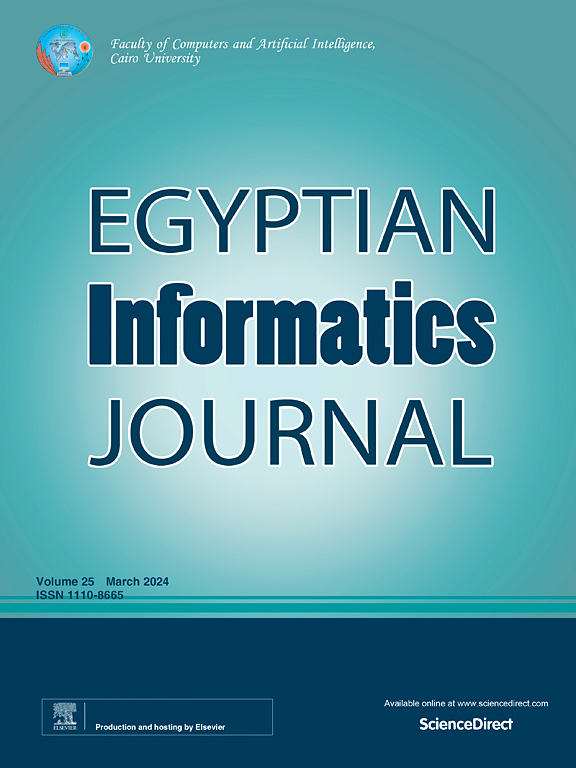Advanced colon cancer detection: Integrating context-aware multi-image fusion (Camif) in a multi-stage framework
IF 5
3区 计算机科学
Q1 COMPUTER SCIENCE, ARTIFICIAL INTELLIGENCE
引用次数: 0
Abstract
Colon cancer begins in the large intestine, often evolving from benign polyps into malignant cancer. Early detection through screening is vital for effective treatment and better survival rates. Risk factors include age, genetics, diet, and lifestyle, with symptoms like changes in bowel habits and blood in the stool, though early stages may be asymptomatic. This work proposed a comprehensive multi classes detection and classification of colon cancer. In this work we used publicly available Curated Colon Dataset to diagnose conditions such as esophagitis, ulcerative colitis, polyps, and normal cases. The proposed approach uses advanced deep learning models to integrate pre-processing, segmentation, and classification. The process begins with pre-processing, which involves resizing, contrast enhancement, noise reduction, and normalization of pixel values. This work proposes a Context-Aware Multi-Image Fusion (CA-MIF) technique in the preprocessing phase to improve the visibility of blood vessels and tissue texture, enhancing diagnostic accuracy. The processed images are then input to a U-Net++ model for segmentation, generating masks highlighting regions of interest, including the colon and affected areas. Post-segmentation, image enhancement techniques further refine the quality and clarity of the images. Enhanced images are then classified using the ResNet-50 model, trained to categorize images into four distinct classes: esophagitis, ulcerative colitis, polyps, and normal. In the classification phase, cancerous classes (ulcerative colitis and polyps) undergo additional segmentation using DeepLabv3+. Model 1 (DeepLabv3+) is applied to ulcerative colitis, generating detailed masks to analyze affected regions, while Model 2 (DeepLabv3+) is used for polyps. For the U-Net++ and DeepLabv3+ models, evaluation measures are segmentation accuracy, precision, recall, and F1 score; for the ResNet-50 model, these metrics are classification accuracy, precision, recall, and F1 score. When it comes to detecting and differentiating between malignant and non-cancerous illnesses, the framework achieves great accuracy., demonstrating its effectiveness and potential for clinical applications in medical image analysis. The results indicate the proposed method’s high efficacy, achieving an F1 score of 99.31. It also demonstrated strong performance metrics with a specificity of 99.91, sensitivity of 99.10, accuracy of 98.18, and a Dice coefficient of 99.82, highlighting its robust capability in accurately detecting colon cancer.
高级结肠癌检测:在多阶段框架中集成上下文感知多图像融合(Camif)
结肠癌起源于大肠,常由良性息肉演变为恶性肿瘤。通过筛查及早发现对于有效治疗和提高生存率至关重要。风险因素包括年龄、遗传、饮食和生活方式,症状包括排便习惯改变和便血,尽管早期可能没有症状。本文提出了一种综合性的结肠癌多分类检测方法。在这项工作中,我们使用公开可用的Curated Colon Dataset来诊断食管炎、溃疡性结肠炎、息肉和正常病例等疾病。该方法使用先进的深度学习模型来集成预处理、分割和分类。该过程从预处理开始,包括调整大小、对比度增强、降噪和像素值的归一化。本研究在预处理阶段提出了一种上下文感知多图像融合(CA-MIF)技术,以提高血管和组织纹理的可见性,提高诊断准确性。然后将处理后的图像输入到unet ++模型中进行分割,生成突出显示感兴趣区域的掩模,包括冒号和受影响的区域。后分割,图像增强技术进一步细化图像的质量和清晰度。然后使用ResNet-50模型对增强图像进行分类,训练后将图像分为四种不同的类别:食管炎、溃疡性结肠炎、息肉和正常。在分类阶段,癌类(溃疡性结肠炎和息肉)使用DeepLabv3+进行额外的分割。模型1 (DeepLabv3+)用于溃疡性结肠炎,生成详细的掩模来分析受影响的区域,模型2 (DeepLabv3+)用于息肉。对于U-Net+和DeepLabv3+模型,评价指标为分割准确率、精密度、召回率和F1分数;对于ResNet-50模型,这些指标是分类准确性、精度、召回率和F1分数。当涉及到检测和区分恶性和非癌性疾病时,该框架达到了很高的准确性。,展示了其在医学图像分析中的有效性和临床应用潜力。结果表明,该方法具有较高的有效性,F1得分为99.31。特异性为99.91,敏感性为99.10,准确性为98.18,Dice系数为99.82,显示了其准确检测结肠癌的强大能力。
本文章由计算机程序翻译,如有差异,请以英文原文为准。
求助全文
约1分钟内获得全文
求助全文
来源期刊

Egyptian Informatics Journal
Decision Sciences-Management Science and Operations Research
CiteScore
11.10
自引率
1.90%
发文量
59
审稿时长
110 days
期刊介绍:
The Egyptian Informatics Journal is published by the Faculty of Computers and Artificial Intelligence, Cairo University. This Journal provides a forum for the state-of-the-art research and development in the fields of computing, including computer sciences, information technologies, information systems, operations research and decision support. Innovative and not-previously-published work in subjects covered by the Journal is encouraged to be submitted, whether from academic, research or commercial sources.
 求助内容:
求助内容: 应助结果提醒方式:
应助结果提醒方式:


